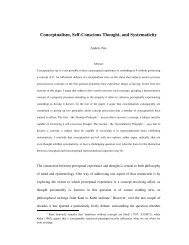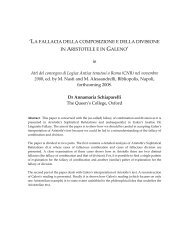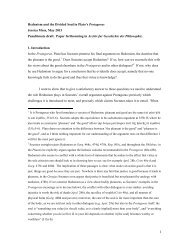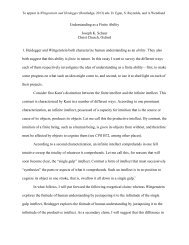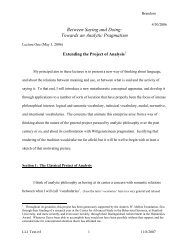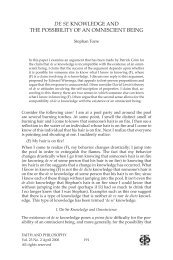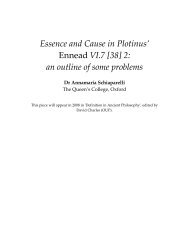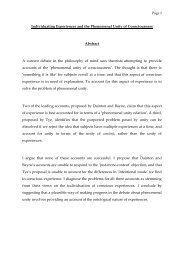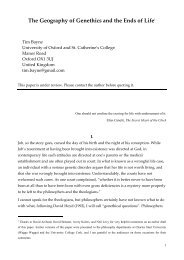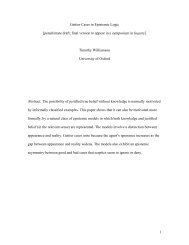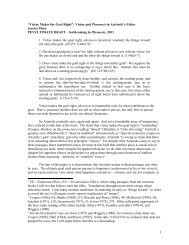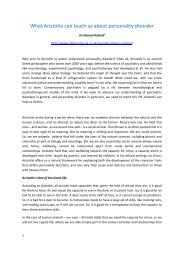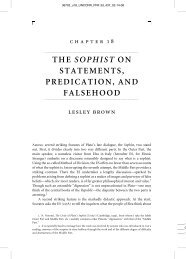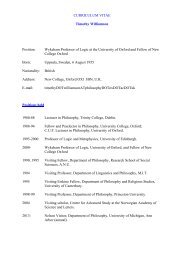Say who everyone is as you go along - Faculty of Philosophy ...
Say who everyone is as you go along - Faculty of Philosophy ...
Say who everyone is as you go along - Faculty of Philosophy ...
Create successful ePaper yourself
Turn your PDF publications into a flip-book with our unique Google optimized e-Paper software.
42<br />
c<strong>as</strong>e we think or perceive erroneously. Nevertheless the thes<strong>is</strong> that form <strong>is</strong> in the<br />
mind <strong>is</strong> common to both philosophies.<br />
Subhutu adopts a position which <strong>is</strong> equally open to an ideal<strong>is</strong>t construal when<br />
he says:<br />
'no d<strong>is</strong>tinction <strong>is</strong> to be made between all things and Maya or a dream; there <strong>is</strong> indeed<br />
between them no dual<strong>is</strong>tic contr<strong>as</strong>t' (ZB3 266)<br />
Th<strong>is</strong> claim admits <strong>of</strong> a Cartesian interpretation. Descartes, in the First Meditation,<br />
entertains the sceptical logical possibility that the <strong>who</strong>le <strong>of</strong> h<strong>is</strong> life <strong>is</strong> a dream. It<br />
follows on th<strong>is</strong> account that 'all things', or at le<strong>as</strong>t what we take to be 'all things',<br />
would be a dream. Although Descartes' ontology <strong>is</strong> mind-body dual<strong>is</strong>m, which <strong>is</strong><br />
incons<strong>is</strong>tent with ideal<strong>is</strong>m, the sceptical possibility <strong>of</strong> life being a dream entails<br />
ideal<strong>is</strong>m because it implies that the physical objects that we ordinarily take to<br />
constitute the external world have only a psychological ex<strong>is</strong>tence. Although<br />
Subhutu's claim does not rule out the Cartesian interpretation, there <strong>is</strong> nothing to<br />
force it either. To see th<strong>is</strong> we may adopt a suggestion <strong>of</strong> Alan Watts. Watts says<br />
'To say [...] that the world <strong>of</strong> facts and events <strong>is</strong> maya <strong>is</strong> to say that the facts and<br />
events are terms <strong>of</strong> me<strong>as</strong>urement rather than realities <strong>of</strong> nature' (WZ 39)<br />
On th<strong>is</strong> understanding we make a m<strong>is</strong>take, a perv<strong>as</strong>ive and systematic m<strong>is</strong>take. We<br />
m<strong>is</strong>take our world-picture for the world. We m<strong>is</strong>take clock time for real time. We<br />
m<strong>is</strong>take feet and inches for physical d<strong>is</strong>tances. We m<strong>is</strong>take words and concepts for<br />
real things. We m<strong>is</strong>take our imaginings for the attitudes or behaviour <strong>of</strong> other<br />
people. In Watts' acute image, we eat the menu.<br />
If we eat the menu, it <strong>is</strong> not surpr<strong>is</strong>ing that we feel uncomfortable. One re<strong>as</strong>on why<br />
eating the menu <strong>is</strong> a m<strong>is</strong>take <strong>is</strong> that we neglect the meal. Living in one’s imagination<br />
<strong>is</strong> not real living. On th<strong>is</strong> view , maya <strong>is</strong> a representation, but not an accurate<br />
representation. Our problem <strong>is</strong> that we think the representation <strong>is</strong> itself reality.<br />
A menu <strong>is</strong> <strong>of</strong> course written in a language. Watts thinks that language <strong>is</strong> essential to<br />
Maya:<br />
'words are the frames , the meshes <strong>of</strong> its net' (WZ 45)<br />
It <strong>is</strong> a familiar thought, from, for example Augustine, Vico and Kant, that the way in<br />
which the world <strong>is</strong> presented to us partly depends upon our lingu<strong>is</strong>tic taxonomy. In<br />
the crude and hackneyed metaphor, <strong>as</strong> a f<strong>is</strong>hing net lets some f<strong>is</strong>h p<strong>as</strong>s through but<br />
captures others, so a language allows thought and talk about some things but not<br />
others. Just <strong>as</strong> a f<strong>is</strong>hing catch might not be a representative sample <strong>of</strong> all the kinds <strong>of</strong><br />
f<strong>is</strong>h there are in the sea, so the ontology facilitated by a language might not be a true<br />
depiction <strong>of</strong> all there <strong>is</strong>. Just <strong>as</strong> the f<strong>is</strong>h caught in our net are the only ones that break<br />
the surface <strong>of</strong> the water, so only the objects depicted in our language break into



